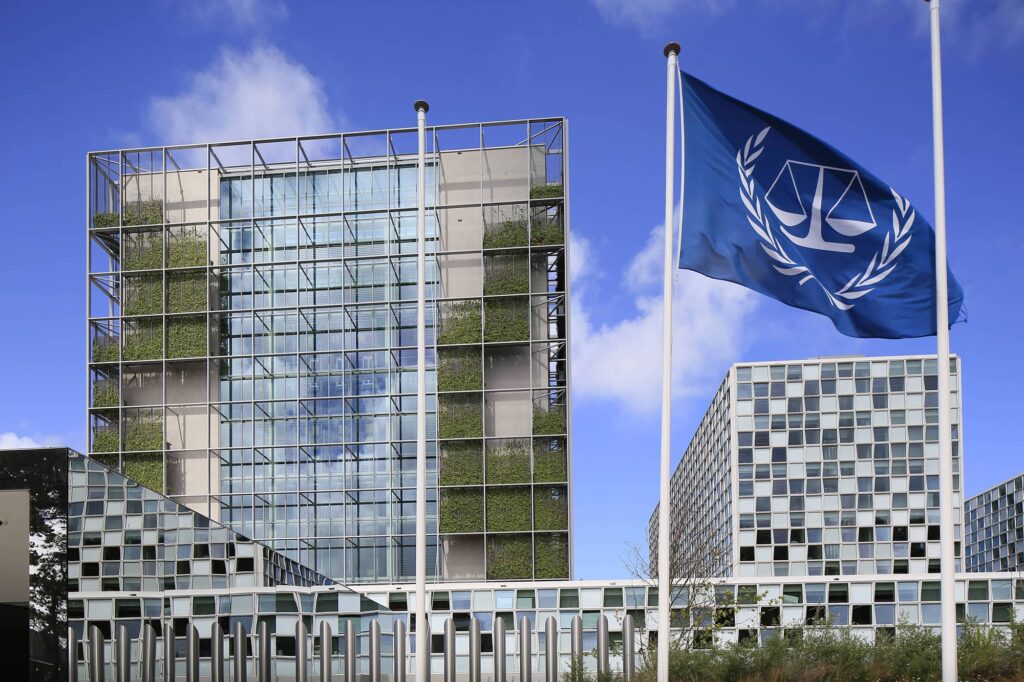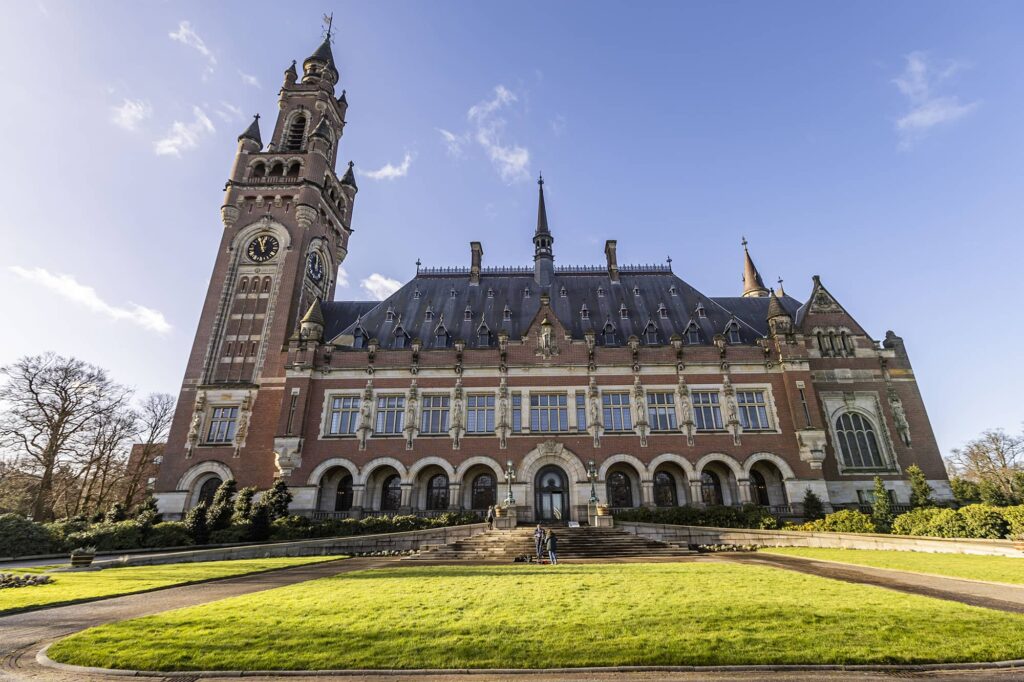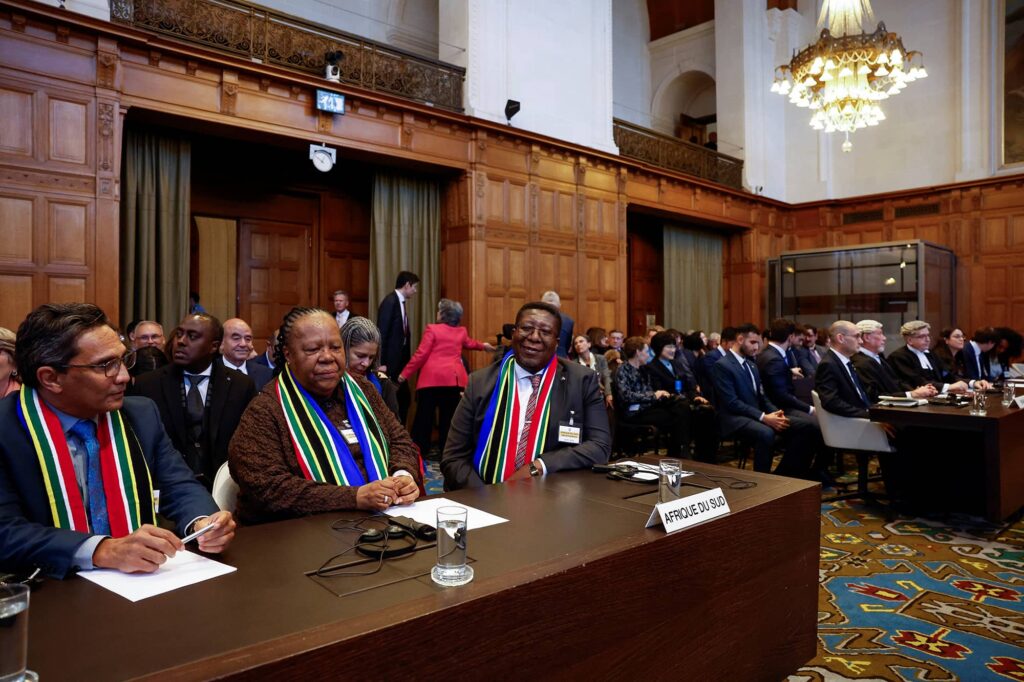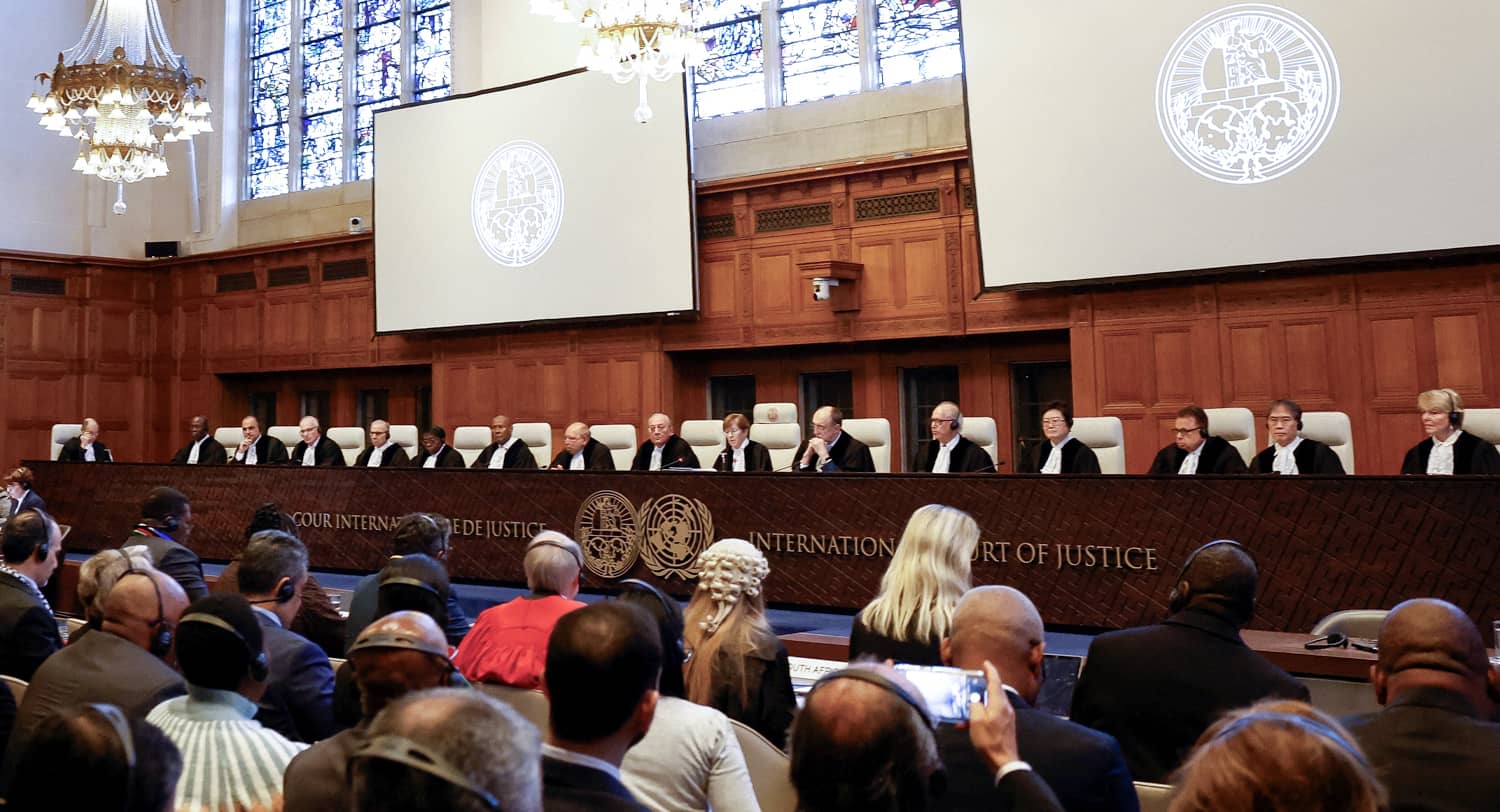When the International Court of Justice in the Hague decided on January 26 not to issue an injunction to stop Israel’s war in Gaza, Israel’s media saw a temporary legal victory. However, the court did not dismiss South Africa’s claim of genocide. Rather it required Israel to report within 30 days on its compliance with the laws of war. If unsatisfied with that report, the court could again consider provisional measures to restrain Israel’s conduct of the war.
The genocide case brought by South Africa against Israel is just one of three fora where Israel has for years faced international legal challenges and will likely continue to do so for years to come.
The first of the three is the United Nations where the focus is on the status of the Palestinian Authority. Second is the International Criminal Court in the Hague, where Israel has sought – and failed – to reject the chief prosecutor’s authority to investigate alleged war crimes by individuals in the occupied territories. The third is the International Court of Justice, where the South African genocide case is actually the third, and probably not the last, round of efforts to put Israel in the dock.
The United Nations
On November 29, 2012, the Palestinian Authority was upgraded from “Non-Member Observer Entity,” a status granted to the Palestine Liberation Organization by the UN General Assembly back in November 1974, to a “Non-Member Observer State.”
This upgrade was widely supported (by a vote of 138 to 9), though there were questions of the Palestinian Authority’s meeting the criteria for statehood (permanent population, agreed territory, effective governance, and independence in the conduct of international relations) established by the Treaty of Montevideo in 1933. The date for the vote was deliberately chosen, 65 years to the day after the General Assembly adopted Resolution 181, partitioning Palestine and ending the British mandate, which had led to the creation of Israel.
This was less than what the Palestinian Authority had originally wanted. A year earlier it tried to obtain full UN membership, as the 194th state, but that act is subject to the recommendation of the UN Security Council, where it failed to muster the necessary 9 of 15 votes (and where the United States was bound to cast a veto). Yet a Non-Member Observer State is a respectable status, held by Italy until 1955, Japan until 1956, and Switzerland as late as 2002. Today it is shared with the Vatican, which was recognized as such in 1964.
The new status entitled the PA to join more than 560 treaties deposited with the Secretary General of the UN. Palestinian accession to one of them – the Statute of Rome on the International Criminal Court – played a major role in derailing the John Kerry peace initiative of 2014.
By September 2015, the General Assembly allowed the Palestinian flag to be flown alongside those of the 193 member states, and in October 2018, it allowed Palestine to preside over the “Group of 77” (in fact, 134) Developing Nations for the following year – despite American protests that this is a privilege preserved for full members. Only three members – United States, Australia and Israel – voted against, 44 abstained or were absent, and 146 supported the Egyptian-sponsored resolution. While symbolic in nature, this was an indication of the scope of support for the Palestinians’ legal and diplomatic positions.

The International Criminal Court
In the summer of 1988, after years of diplomatic efforts, the Statute of Rome was signed, establishing a permanent International Criminal Court. Following ratification by 60 of the signatories, the International Criminal Court began its work in 2002. Today, there are 124 countries which recognize its authority. Israel participated in its drafting but ultimately voted against the Statute, after Egypt and Syria led a successful effort to include a clause that penalizes the transfer by an occupying power of its own civilian population into the territory it occupies, language directed against Israeli settlements in the West Bank and East Jerusalem.
Israel and the United States both signed the Statute on December 31, 2000, but in 2002, both countries (for differing reasons) announced that they would neither ratify the Statute nor consider themselves bound by its provisions. Israel cited its opposition to the clause on transfer of its civilian population as well as the absence of any reference to terrorism as a war crime.
In 2009, the Palestinian Authority asked the International Criminal Court to grant its chief prosecutor at the time, the Argentinian Luis Moreno Ocampo, ad hoc authority over crimes allegedly committed by Israel in the West Bank, Gaza Strip and East Jerusalem since 2002. In April 2012, however, Ocampo determined that “Palestine” was not a recognized state for the purposes of the Statue – implying that if and when that status changed, the jurisdiction might change.
Israel’s sense of relief was short-lived. First came a case submitted by the Union of the Comoros in May 2013 to Ocampo’s successor, Fatou Bensouda from Gambia, pertaining to the Turkish flotilla of ships which attempted to break the maritime blockade of Gaza in May 2010. Those Turkish ships flew the Comoros flag. Bensouda decided not to investigate the Comorian claim, stating that the matter was not grave enough to cross the threshold requiring the court’s intervention. The Comoros requested a re-consideration, which was supported by the Court’s pre-trial chamber in July 2015 and again in November 2018. Finally, while still critical of Bensouda’s failure to investigate, the chamber decided in September 2020 that it could not force the prosecutor’s hand on this matter.
Bensouda did take action on the Palestinian Authority’s request to investigate alleged Israeli war crimes in the occupied territories, after the PA had become a UN observer state and signed the Geneva Conventions. In January 2020, Bensouda concluded that she had the authority to launch an investigation against both sides regarding: first, the transfer of Israel’s civilian population into the occupied territories; second, at least three cases of deliberate and disproportionate attacks on civilian targets and medical facilities during Israel’s Gaza operation of 2014; and third, Israel’s use of force during the disturbances on the Gaza fence in 2018, which involved a high number of casualties. This investigation earned a sharp Israeli rebuke and rejection of the prosecutor’s authority.
If in 2022, the ICC budget seemed to indicate that the investigation was assigned a low priority, the war which began on October 7 might raise this investigation’s profile. The current chief prosecutor, the British jurist Karim Ahmad Khan, visited Israel in December 2023 with the stated intention of accelerating the investigation and expanding it to the events of the current war in the “State of Palestine.” Israel did not officially engage with him.
Israel’s claim of complementarity – i.e., that Israel has the judicial capacity and will of its own to prosecute individuals who may have committed crimes during a war – applies to Israel’s military operations, but is not quite relevant to the clause criminalizing an occupying power’s transfer of its civilian population into the occupied territory. Karim Khan may choose to endorse a narrow interpretation of this clause, which would not include an “indirect” role by government officials in encouraging (not forcing) individuals to settle in the territories. At the same time, US and UK governments’ designations of individual settlers may point to actions he may also decide to emulate.

The International Court of Justice
Whereas the International Criminal Court brings to trial individual perpetrators, the International Court of Justice rules on cases between states. Originally created in 1913, it was reconstituted in June 1945 as the judicial arm of the UN. It has two capacities: adjudicating cases between states which have either accepted its authority or have been referred to the court by the UN Security Council; and issuing non-binding advisory opinions at the request of the Security Council or General Assembly.
In September 1950, Israel accepted the ICJ authority (albeit coupled with a refusal to come before it with any state that does not recognize Israel’s existence). Indeed, in October 1957 it submitted a case against Bulgaria regarding the shooting down of an El-Al plane. In November 1985, when the United States rejected the Court’s authority (in a case brought by Nicaragua), so did Israel.
Thus, when the UN General Assembly in December 2003 asked for an ICJ advisory opinion on the construction of Israel’s security barrier “in the Occupied Palestinian Territories,” Israel refused to recognize the ICJ authority. It also declined to appoint a justice to sit on the case, a right reserved for countries facing a hearing but which are not represented among the 15 justices. It did submit a paper disputing the ICJ’s right to deliberate on an internal Israeli security matter. While the United States and 22 other democracies supported Israel’s view, the ICJ did not accept it.
In July 2004, with one dissenting opinion (that of the American justice, Thomas Buergenthal, the court took note of Israel’s promise that the barrier is temporary security measure, but nevertheless warned that it may amount to de-facto annexation, and declared it to be unlawful and called on Israel to dismantle all sections which were built beyond the 1967 lines and compensate Palestinians who were harmed.
A second legal battle at the ICJ began in December 2022, when the UN General Assembly voted to endorse both the 2004 ICJ ruling on Israel’s security barrier and a UN report investigating the May 2021 conflict between Israel and Gaza. The open session has been set for 19 February 2024. Israel has again denied the court’s jurisdiction.
Finally, the third battle is the case brought by South Africa under the Convention on the Prevention and Punishment of the Crime of Genocide, which mandates that disputes should be brought before the court. On December 29, 2023, South Africa claimed that Israel – which promoted the convention and joined it in March 1950 – was in breach of the convention in its war in Gaza, and asked the ICJ for provisional measures that would force Israel to desist – i.e., end the war.

The crime of genocide involves both intent to destroy (the claim rested on public statements by Israeli politicians and military men, both serving and retired, that could be read as calling for annihilation of Gazans), and actual commission. In this respect, the claim was that the number of civilians killed, the humanitarian crisis, and the scope of the destruction constitute material evidence of acts of genocide. Israel’s counter-arguments were that the quotes were taken out of context and did not reflect the views of the decision makers; and that its military actions are subject to international law, both in terms of the decision to go to a war of self-defense and the manner in which it is being conducted.
The ICJ’s order, as relayed above, included six provisional measures, specifically calling on Israel to avoid acts of genocide and to secure humanitarian supplies. It also ordered – notably, without dissent from the Israeli justice added to the bench, former Chief Justice Aharon Barak – an end to any incitement to mass murder. The Genocide Convention indeed requires the punishment not only of active perpetrators but also of those who conspire to carry it out or publicly advocate it.
Israel’s fear of an injunction to end the war did not materialize. But the South African claim was not dismissed outright, the ruling’s language was harsh, and the 30-day reporting requirement leaves open the option of further demands for provisional measures. The court’s hearings on this issue, as with the ongoing advisory opinion on the security barrier, could take years, with all that this implies for Israel’s reputation.
Conclusion
The UN General Assembly resolutions, ICJ opinions and ICC investigations complement each other, increasingly de-legitimizing Israel’s actions, even when taken in self-defense. Perhaps most significantly, they could be translated into calls for sanctions and the marking of Israel as an internationally isolated pariah.
Even if the findings would not be endorsed by the Security Council, owing to an American veto, they could still be used by the Palestinians and their supporters to harm Israel’s international standing and generate negative economic effects. These include restricting tourism, trade, and investment. It is important for Israel not to come to be viewed as the side that seeks to impose its will by force rather than leaves the door open to a negotiated agreement.

